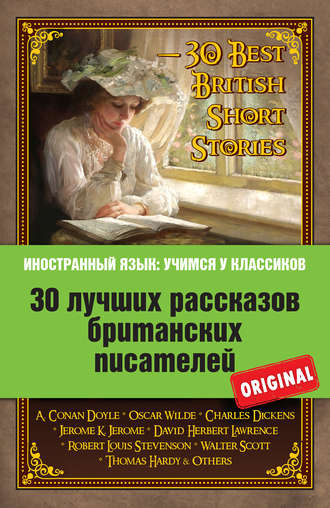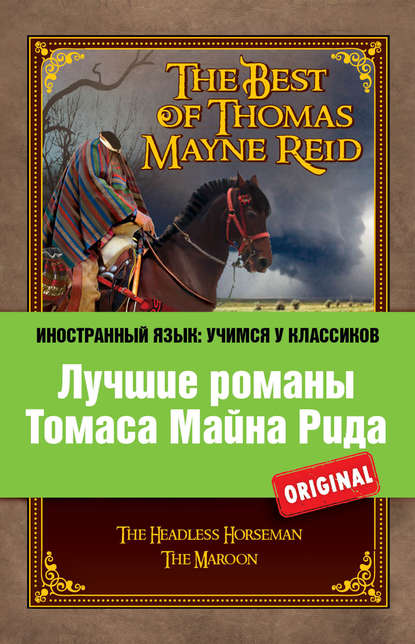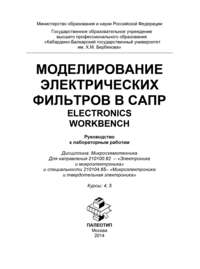
Полная версия
30 лучших рассказов британских писателей / 30 Best British Short Stories

30 лучших рассказов британских писателей / 30 Best British Short Stories
Составление комментариев Н. Самуэльян
В оформлении обложки использована репродукция картины «Леди, читающая у окна» художникаТомаса Бенджамина Кеннингтона (1856–1916)
© Самуэльян Н. А., составление комментариев, 2014
© ООО «Издательство «Эксмо», 2015
A.J. Alan
My Adventure in Norfolk
I don’t know how it is with you, but during Februarymywife generally says to me: ‘Have you thought at all about what we are going to do for August?’ And, of course, I say, ‘No,’ and then she begins looking through the advertisements of bungalowsto let.
Well, this happened last year, as usual, and she eventually produced one that looked possible. It said: ‘Norfolk– Hickling Broad – Furnished Bungalow – Garden – Garage, Boathouse,’ and all the rest of it – Oh – andplate and linen. It also mentioned an exorbitant rent. I pointed out the bit about the rent, but my wife said: ‘Yes, you’ll have to go down and see the landlord, and get him to come down. They always do.’ As a matter of fact, they always don’t, but that’s a detail.
Anyway, I wrote off to the landlord and asked if he could arrange for me to stay the night in the place to see what it was really like. He wrote back and said: ‘Certainly,’ and that he was engaging Mrs. So-and-So to come in and ‘oblige me,’ and make up the beds and so forth.
I tell you, we do things thoroughly – in our family – I have to sleep in all the beds, and when I come home my wife counts the bruises and decides whether they will do or not.
At any rate, I arrived, in a blinding snowstorm, at aboutthemost desolate spot on God’s earth. I’d come to Potter Heigham by train, and been driven on (it was a good five miles from the station). Fortunately, Mrs. Selston, the old lady who was going to ‘do’ for me, was there, and she’d lighted a fire, and cooked me a steak, for which I was truly thankful.
I somehow think the cow, or whatever they get steaks off, had only died that morning. It was very – er – obstinate. While I dined, she talked to me. Shewouldtell me all about an operation her husband had just had. Allabout it. It was almost a lecture on surgery. The steak was rather underdone, and it sort of made me feel I was illustrating her lecture. Anyway, she put me clean off my dinner, and then departed for the night.
I explored the bungalow and just had a look outside. It was, of course, very dark, but not snowing quite so hard. The garage stood about fifteen yards from the back door. I walked round it, but didn’t go in. I also went down to the edge of the broad, and verified the boathouse. The whole place looked as though it might be all right in the summertime, but just then it made one wonder why people ever wanted to go to the North Pole.
Anyhow, I went indoors, and settled down by the fire. You’ve no idea how quiet it was; even the waterfowl had taken a night off – at least, they weren’t working.
At a few minutes to eleven I heard the first noise there’d been since Mrs. What’s-her-name – Selston – had cleared out. It was the sound of a car. If it had gone straight by I probably shouldn’t have noticed it at all, only it didn’t go straight by; it seemed to stop farther up the road, before it got to the house. Even that didn’t make much impression. After all, carsdostop.
It must have been five or ten minutes before it was borne in on me that it hadn’t gone on again. So I got up and looked out of the window. It had left off snowing, and there was a glare through the gate that showed that there were headlamps somewhere just out of sight. I thought I might as well stroll out and investigate.
I found a fair-sized limousine pulled up in the middle of the road about twenty yards short of my gate. The light was rather blinding, but when I got close to it I found a girl with the bonnet open, tinkering with the engine. Quite an attractive young female, from what one could see, but she was so muffled up in furs that it was rather hard to tell.
I said:
‘Er – good evening – anything I can do.’
She said she didn’t know what was the matter. The engine had just stopped, and wouldn’t start again. And ithad! It wouldn’t even turn, either with the self-starter or the handle. The whole thing was awfully hot, and I asked her whether there was any water in the radiator. She didn’t see why there shouldn’t be, there always had been. This didn’t strike me as entirely conclusive. I said, we’d better put some in, and see what happened. She said, why not use snow? But I thought not. There was an idea at the back of my mind that there was some reason why it was unwise to use melted snow, and it wasn’t until I arrived back with a bucketful that I remembered what it was. Of course – goitre.
When I got back to her she’d got the radiator cap off, and inserted what a Danish friend of mine calls a ‘funeral.’ We poured a little water in.... Luckily I’d warned her to stand clear. The first tablespoonful that went in came straight out again, red hot, and blew the ‘funeral’ sky-high. We waited a few minutes until things had cooled down a bit, but it was no go. As fast as we poured water in it simply ran out again into the road underneath. It was quite evident that she’d been driving with the radiator bone dry and that her engine had seized right up.
I told her so. She said:
‘Does that mean I’ve got to stop here all night?’
I explained that it wasn’t as bad as all that; that is, if she cared to accept the hospitality of my poor roof (and itwasa poor roof – it let the wet in). But she wouldn’t hear of it. By the by, she didn’t know the – er – circumstances, so it wasn’t that. No, she wanted to leave the car where it was and go on on foot.
I said:
‘Don’t be silly, it’s miles to anywhere.’
However, at that moment we heard a car coming along the road, the same way as she’d come. We could see its lights, too, although it was a very long way off. You know how flat Norfolk is – you can see a terrific distance.
I said:
‘There’s the way out of all your troubles. This thing, whatever it is, will give you a tow to the nearest garage, or at any rate a lift to some hotel.’
One would have expected her to show some relief, but she didn’t. I began to wonder what she jolly welldidwant. She wouldn’t let me help her to stop where she was, and she didn’t seem anxious for anyone to help her to go anywhere else.
She was quite peculiar about it. She gripped hold of my arm, and said:
‘What do you think this is that’s coming?’
I said:
‘I’m sure I don’t know, being a stranger in these parts, but it sounds like a lorry full of milk cans.’
I offered to lay her sixpence about it (this was before the betting-tax came in). She’d have had to pay, too, because itwasa lorry full of milk cans. The driver had to pull up because there wasn’t room to get by.
He got down and asked if there was anything he could do to help. We explained the situation. He said he was going toNorwich, and was quite ready to give her a tow if she wanted it. However, she wouldn’t do that, and it was finally decided to shove her car into my garage for the night, to be sent for next day, and the lorry was to take her along to Norwich.
Well, I managed to find the key of the garage, and the lorry-driver – Williams, his name was – and I ran the car in and locked the door. This having been done – (ablative absolute) – I suggested that it was a very cold night. Williams agreed, and said he didn’t mind if he did. So I took them both indoors and mixed them a stiff whisky and water each. There wasn’t any soda. And, naturally, the whole thing had leftmevery cold, too. I hadn’t an overcoat on.
Up to now I hadn’t seriously considered the young woman. For one thing it had been dark,andthere had been a seized engine to look at. Er – I’m afraid that’s not a very gallant remark. What I mean is that to anyone with a mechanical mind a motor-car in that condition is much more interesting than – er – well, it isvery interesting – but why labour the point? However, in the sitting-room, in the lamplight, it was possible to get more of an idea. She was a little older than I’d thought, and her eyes were too close together.
Of course, she wasn’t a – how shall I put it? Her manners weren’t quite easy and she was careful with her English.Youknow. But that wasn’t it. She treated us with a lack of friendliness which was – well, we’d done nothing to deserve it. There was a sort of vague hostility and suspicion, which seemed rather hard lines, considering. Also, she was so anxious to keep in the shadow that if I hadn’t moved the lamp away she’d never have got near the fire at all.
And the way she hurried the wretched Williams over his drink was quite distressing; and foolish, too, ashewas going to drive, but that was her – funnel. When he’d gone out to start up his engine I asked her if she was all right for money, and she apparently was. Then they started off, and I shut up the place and went upstairs.
There happened to be a local guide-book in my bedroom, with maps in it. I looked at these and couldn’t help wondering where the girl in the car had come from; I mean my road seemed so very unimportant. The sort of road one might use if one wanted to avoid people. If one were driving a stolen car, for instance. This was quite a thrilling idea. I thought it might be worth while having another look at the car. So I once more unhooked the key from the kitchen dresser and sallied forth into the snow. It was as black as pitch, and so still that my candle hardly flickered. It wasn’t a large garage, and the car nearly filled it. By the by, we’d backed it in so as to make it easier to tow it out again.
The engine I’d already seen, so I squeezed past along the wall and opened the door in the body part of the car. At least, I only turned the handle, and the door was pushed open from the inside and – something – fell out on me. It pushed me quite hard, and wedged me against the wall. It also knocked the candle out of my hand and left me in the dark – which was a bit of a nuisance. I wondered what on earth the thing was – barging into me like that – so I felt it, rather gingerly, and found it was a man – a dead man – with a moustache. He’d evidently been sitting propped up against the door. I managed to put him back, as decorously as possible, and shut the door again.
After a lot of grovelling about under the car I found the candle and lighted it, and opened the opposite door and switched on the little lamp in the roof – and then – oo-er!
Of course, I had to make some sort of examination. He was an extremely tall and thin individual. He must have been well over six feet three. He was dark and very cadaverous-looking. In fact, I don’t suppose he’d ever looked so cadaverous in his life. He was wearing a trench coat.
It wasn’t difficult to tell what he’d died of. He’d been shot through the back. I found the hole just under the right scrofula, or scalpel – what is shoulder-blade, anyway? Oh, clavicle – stupid of me – well, that’s where it was, and the bullet had evidently gone through into the lung. I say ‘evidently,’ and leave it at that.
There were no papers in his pockets, and no tailor’s name on his clothes, but there was a note-case, with nine pounds in it. Altogether a most unpleasant business. Of course, it doesn’t do to question the workings of Providence, but one couldn’t help wishing it hadn’t happened. It was just a little mysterious, too – er – who had killed him. It wasn’t likely that the girl had or she wouldn’t have been joy-riding about the country with him; and if someone else had murdered him why hadn’t she mentioned it? Anyway, she hadn’t and she’d gone, so one couldn’t do anything for the time being. No telephone, of course. I just locked up the garage and went to bed. That was two o’clock.
Next morning I woke early, for some reason or other, and it occurred to me as a good idea to go and have a look at things – by daylight, and before Mrs. Selston turned up. So I did. The first thing that struck me was that it had snowed heavily during the night, because there were no wheel tracks or footprints, and the second was that I’d left the key in the garage door. I opened it and went in. The place was completely empty. No car, no body, no nothing. There was a patch of grease on the floor where I’d dropped the candle, otherwise there was nothing to show I’d been there before. One of two things must have happened: either some people had come along during the night and taken the car away, or else I’d fallen asleep in front of the fire and dreamt the whole thing.
Then I remembered the whisky glasses.
They should still be in the sitting-room. I went back to look, and they were, all three of them. So ithadn’tbeen a dream and the car hadbeen fetched away, but they must have been jolly quiet over it.
The girl had left her glass on the mantel-piece, and it showed several very clearly defined finger-marks. Some were mine, naturally, because I’d fetched the glass from the kitchen and poured out the drink for her, but hers, her finger-marks, were clean, and mine were oily, so it was quite easy to tell them apart. It isn’t necessary to point out that this glass was very important. There’d evidently been a murder, or something of that kind, and the girl must have known all about it, even if she hadn’t actually done it herself, so anything she had left in the way of evidence ought to be handed over to the police; and this was all shehadleft. So I packed it up with meticulous care in an old biscuit-box out of the larder.
When Mrs. Selston came I settled up with her and came back to Town. Oh, I called on the landlord on the way and told him I’d ‘let him know’ about the bungalow. Then I caught my train, and in due course drove straight to Scotland Yard. I went up and saw my friend there. I produced the glass and asked him if his people could identify the marks. He said: ‘Probably not,’ but he sent it down to the fingerprint department and asked me where it came from. I said: ‘Never you mind; let’s have the identification first.’ He said: ‘All right.’
They’re awfully quick, these people – the clerk was back in three minutes with a file of papers. They knew the girl all right. They told me her name and showed me her photograph; not flattering. Quite an adventurous lady, from all accounts. In the early part of her career she’d done time twice for shop-lifting, chiefly in the book department. Then she’d what they call ‘taken up with’ a member of one of those race-gangs one sometimes hears about.
My pal went on to say that there’d been a fight between two of these gangs, in the course of which her friend had got shot. She’d managed to get him away in a car, but it had broken down somewhere in Norfolk. So she’d left it and the dead man in someone’s garage, and had started off for Norwich in a lorry. Only she never got there. On the way the lorry had skidded, and both she and the driver – a fellow called Williams – had been thrown out, and they’d rammed their heads against a brick wall, which everyone knows is a fatal thing to do. At least, it was in their case.
I said: ‘Look here, it’s all very well, but you simply can’t know all this; there hasn’t been time – it only happened last night.’
He said: ‘Last night be blowed! It all happened in February, nineteen nineteen. The people you’ve described have been dead for years.’
I said: ‘Oh!’
And to think that I might have stuck to that nine pounds!
Stacy Aumonier
Where Was Wych Street?
In the public bar of the Wagtail, inWapping, four men and a woman were drinking beer and discussing diseases. It was not a pretty subject, and the company was certainly not a handsome one. It was a dark November evening, and the dingy lighting of the bar seemed but to emphasize the bleak exterior. Drifts of fog and damp from without mingled with the smoke of shag. The sanded floor was kicked into a muddy morass not unlike the surface of the pavement. An old lady down the street had died from pneumonia the previous evening, and the event supplied a fruitful topic of conversation. The things that one could get! Everywhere were germs eager to destroy one. At any minute the symptoms might break out. And so – one foregathered in a cheerful spot amidst friends, and drank forgetfulness.
Prominent in this little group was Baldwin Meadows, a sallow-faced villain with battered features and prominent cheek-bones, his face cut and scarred by a hundred fights. Ex-seaman, ex-boxer, ex-fish-porter – indeed, to every one’s knowledge, ex-everything. No one knew how he lived. By his side lurched an enormous coloured man who went by the name of Harry Jones. Grinning above a tankard sat a pimply-faced young man who was known as The Agent. Silver rings adorned his fingers. He had no other name, and most emphatically no address, but he ‘arranged things’ for people, and appeared to thrive upon it in a scrambling, fugitive manner. The other two people were Mr. and Mrs. Dawes. Mr. Dawes was an entirely negative person, but Mrs. Dawes shone by virtue of a high, whining, insistent voice, keyed to within half a note of hysteria.
Then, at one point, the conversation suddenly took a peculiar turn. It came about through Mrs. Dawes mentioning that her aunt, who died from eating tinned lobster, used to work in a corset shop in Wych Street. When she said that, The Agent, whose right eye appeared to survey the ceiling, whilst his left eye looked over the other side of his tankard, remarked:
‘Where was Wych Street, ma?’
‘Lord!’ exclaimed Mrs. Dawes. ‘Don’t you know, dearie? You must be a young ’un, you must. Why, when I was a gal every one knew Wych Street. It was just down there where they built the Kingsway, like.’
Baldwin Meadows cleared his throat, and said:
‘Wych Street used to be a turnin’ runnin’ from Long Acre into Wellington Street.’
‘Oh, no, old boy,’ chipped in Mr. Dawes, who always treated the ex-man with great deference. ‘If you’ll excuse me, Wych Street was a narrow lane at the back ofthe old Globe Theatrethat used to pass by the church.’
‘I know what I’m talkin’ about,’ growled Meadows. Mrs. Dawes’s high nasal whine broke in:
‘Hi, Mr. Booth, you used ter know yer wye abaht. Where was Wych Street?’
Mr. Booth, the proprietor, was polishing a tap. He looked up.
‘Wych Street? Yus, of course I knoo Wych Street. Used to go there with some of the boys – when I wasCovent Gardenway. It was at right angles to the Strand, just east of Wellington Street.’
‘No, it warn’t. It were alongside the Strand, before yer come to Wellington Street.’
The coloured man took no part in the discussion, one street and one city being alike to him, provided he could obtain the material comforts dear to his heart; but the others carried it on with a certain amount of acerbity.
Before any agreement had been arrived at three other men entered the bar. The quick eye of Meadows recognized them at once as three of what was known at that time as ‘The Gallows Ring.’ Every member of ‘The Gallows Ring’ had done time, but they still carried on a lucrative industry devoted to blackmail, intimidation, shoplifting, and some of the clumsier recreations. Their leader, Ben Orming, had served seven years for bashing a Chinaman down at Rotherhithe.
‘The Gallows Ring’ was not popular in Wapping, for the reason that many of their depredations had been inflicted upon their own class. When Meadows and Harry Jones took it into their heads to do a little wild prancing they took the trouble to go up into the West-end. They considered ‘The Gallows Ring’ an ungentlemanly set; nevertheless, they always treated them with a certain external deference – an unpleasant crowd to quarrel with.
Ben Orming ordered beer for the three of them, and they leant against the bar and whispered in sullen accents. Something had evidently miscarried with the Ring. Mrs. Dawes continued to whine above the general drone of the bar. Suddenly she said:
‘Ben, you’re a hot old devil, you are. We was just ’aving a discussion like. Where was Wych Street?’
Ben scowled at her, and she continued:
‘Some sez it was one place, some sez it was another. Iknowwhere it was, ’cors my aunt what died from blood p’ison, after eatin’ tinned lobster, used to work at a corset shop –’
‘Yus,’ barked Ben, emphatically. ‘I know where Wych Street was – it was just sarth of the river, afore yer come toWaterloo Station.’
It was then that the coloured man, who up to that point had taken no part in the discussion, thought fit to intervene.
‘Nope. You’s all wrong, cap’n. Wych Street were alongside de church, way over where the Strand takes a side-line up west.’
Ben turned on him fiercely.
‘What the blazes does a blanketty nigger know abaht it? I’ve told yer where Wych Street was.’
‘Yus, and I know where it was,’ interposed Meadows.
‘Yer both wrong. Wych Street was a turning running from Long Acre into Wellington Street.’
‘I didn’t ask yer whatyouthought,’ growled Ben.
‘Well, I suppose I’ve a right to an opinion?’
‘You always think you know everything, you do.’
‘You can just keep yer mouth shut.’
‘It ’ud take more’n you to shut it.’
Mr. Booth thought it advisable at this juncture to bawl across the bar: ‘Now, gentlemen, no quarrelling – please.’
The affair might have been subsided at that point, but for Mrs. Dawes. Her emotions over the death of the old lady in the street had been so stirred that she had been, almost unconsciously, drinking too much gin. She suddenly screamed out:
‘Don’t you take no lip from ’im, Mr. Medders. The dirty, thieving devil, ’e always thinks ’e’s goin’ to come it over every one.’
She stood up threateningly, and one of Ben’s supporters gave her a gentle push backwards. In three minutes the bar was in a complete state of pandemonium. The three members of ‘The Gallows Ring’ fought two men and a woman, for Mr. Dawes merely stood in a corner and screamed out:
‘Don’t! Don’t!’
Mrs. Dawes stabbed the man who had pushed her through the wrist with a hatpin. Meadows and Ben Orming closed on each other and fought savagely with the naked fists. A lucky blow early in the encounter sent Meadows reeling against the wall, with blood streaming down his temple. Then the coloured man hurled a pewter tankard straight at Ben and it hit him on the knuckles. The pain maddened him to a frenzy. His other supporter had immediately got to grips with Harry Jones, and picked up one of the high stools and, seizing an opportunity, brought it down crash on to the coloured man’s skull.
The whole affair was a matter of minutes. Mr. Booth was bawling out in the street. A whistle sounded. People were running in all directions.
‘Beat it! Beat it for God’s sake!’ called the man who had been stabbed through the wrist. His face was very white, and he was obviously about to faint.
Ben and the other man, whose name was Toller, dashed to the door. On the pavement there was a confused scramble. Blows were struck indiscriminately. Two policemen appeared. One was laidhors de combatby a kick on the knee-cap from Toller. The two men fled into the darkness, followed by a hue-and-cry. Born and bred in the locality, they took every advantage of their knowledge. They tacked through alleys and raced down dark mews, and clambered over walls. Fortunately for them, the people they passed, who might have tripped them up or aided in the pursuit, merely fled indoors. The people in Wapping are not always on the side of the pursuer. But the police held on. At last Ben and Toller slipped through the door of an empty house in Aztec Street barely ten yards ahead of their nearest pursuer. Blows rained on the door, but they slipped the bolts, and then fell panting to the floor. When Ben could speak, he said:
‘If they cop us, it means swinging.’
‘Was the nigger done in?’
‘I think so. But even if ’e wasn’t, there was that other affair the night before last. The game’s up.’
The ground-floor rooms were shuttered and bolted, but they knew that the police would probably force the front door. At the back there was no escape, only a narrow stable yard, where lanterns were already flashing. The roof only extended thirty yards either way and the police would probably take possession of it. They made a round of the house, which was sketchily furnished. There was a loaf, a small piece of mutton, and a bottle of pickles, and – the most precious possession – three bottles of whisky. Each man drank half a glass of neat whisky; then Ben said: ‘We’ll be able to keep ’em quiet for a bit, anyway,’ and he went and fetched an old twelve-bore gun and a case of cartridges. Toller was opposed to this last desperate resort, but Ben continued to murmur, ‘It means swinging, anyway.’












